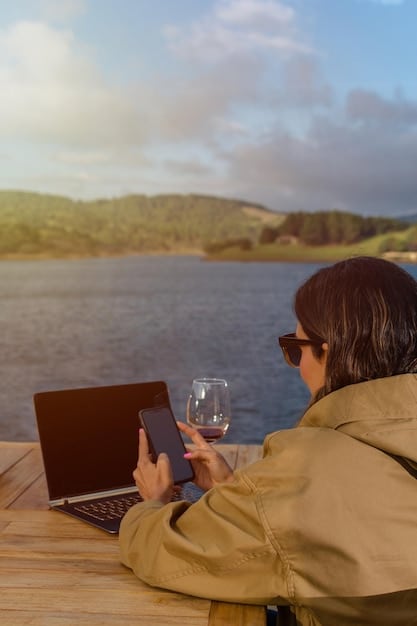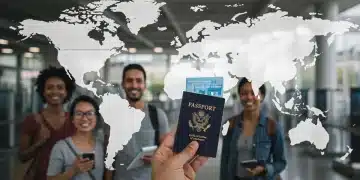Work-Life Balance for US Digital Nomads: Expert Strategies

Maintaining a healthy work-life balance as a digital nomad in the US involves setting boundaries, prioritizing self-care, leveraging technology, and creating a supportive community.
Embarking on a digital nomad journey in the US can be incredibly liberating, offering the freedom to explore diverse landscapes while pursuing your professional goals. However, the allure of constant travel and remote work can easily blur the lines between your personal and professional life. Let’s discuss how to maintain a healthy work-life balance as a digital nomad in the US: Expert Tips to thrive in this dynamic lifestyle.
Understanding the Unique Challenges of Work-Life Balance for Digital Nomads in the US
The digital nomad lifestyle comes with its own set of challenges when it comes to finding balance. The freedom to work anywhere can quickly turn into the pressure to work everywhere, at all times. Understanding these challenges is the first step towards creating a sustainable and fulfilling nomadic life in the US.
These challenges are often amplified by the constant need to adapt to new environments, time zones, and social circles, all while trying to maintain consistent productivity and meet deadlines. It’s a juggling act that requires careful planning and mindful execution.
Location-Specific Considerations in the US
Different locations in the US offer unique opportunities and challenges for digital nomads. From the bustling cities of the East Coast to the laid-back vibes of the West Coast, the cost of living, internet connectivity, and cultural norms can vary significantly. These location-specific factors can impact both your work and personal life.
- Cost of Living: Major cities like New York and San Francisco have a higher cost of living, which can put pressure on your income and require longer working hours to maintain your desired lifestyle.
- Internet Connectivity: While most urban areas have reliable internet, remote areas like national parks might have limited or spotty connectivity, affecting your ability to work. It is important to research internet access for any nomad spot.
- Time Zones: Traveling across different time zones can disrupt your sleep schedule and make it challenging to coordinate with clients or team members in other parts of the country. Schedule travel carefully.
Ultimately, finding a sustainable work-life balance as a digital nomad in the US requires a proactive approach, mindful planning, and a willingness to adapt to the unique challenges that this lifestyle presents. By understanding these challenges, setting realistic expectations, and implementing effective strategies, you can create a fulfilling and balanced nomadic life across the United States.
Setting Clear Boundaries Between Work and Personal Time
One of the most effective strategies for balancing work and life as a digital nomad is setting clear boundaries. When your office is wherever you are, it’s easy for work to bleed into every aspect of your life. Establishing firm boundaries can protect your personal time and prevent burnout.
Setting boundaries starts with recognizing the habits and patterns that disrupt your balance. A well-defined schedule and dedicated workspace can help maintain boundaries and keep your work life under control.

Creating a Dedicated Workspace
Having a designated workspace is crucial for separating work from leisure. This could be a co-working space, a desk in your accommodation, or even a specific corner in a coffee shop. The key is to create a physical and mental separation between your work and personal life.
Maintaining a consistent workspace helps your brain associate that area with work, making it easier to focus when you’re there and relax when you’re not. Make sure the workspace is conducive to productivity, with minimal distractions and proper ergonomics.
Establishing a Daily Schedule and Sticking to It
A well-structured daily schedule is essential for maintaining balance. Set specific start and end times for your workday and stick to them as closely as possible. Schedule regular breaks throughout the day to recharge and prevent mental fatigue. Even if your schedule changes daily, work to bookend your working time with other activities.
- Time Blocking: Allocate specific blocks of time for different tasks, such as emails, meetings, and focused work.
- Prioritize Tasks: Identify your most important tasks for the day and tackle them during your most productive hours.
- Schedule Breaks: Incorporate regular breaks for meals, exercise, and relaxation to avoid burnout.
By setting clear boundaries and creating a structured schedule, digital nomads can maintain a healthier work-life balance and enjoy the flexibility and freedom that this lifestyle offers.
Prioritizing Self-Care and Wellness on the Road
The demands of travel and remote work as a digital nomad can take a toll on your physical and mental health. Prioritizing self-care and wellness is not a luxury, but a necessity for maintaining long-term sustainability and enjoyment in this lifestyle. Neglecting your well-being can lead to burnout, decreased productivity, and a diminished quality of life.
Incorporating regular self-care practices into your daily routine can help you stay grounded, manage stress, and maintain a positive outlook, even when navigating the challenges of nomadic life.
The Importance of Physical Activity and Healthy Eating
Regular physical activity and a balanced diet are fundamental to your overall well-being. Exercise can boost your mood, reduce stress, and improve your physical health. Healthy eating provides the energy and nutrients you need to stay focused and productive. These tips are relevant even when you consider you are a digital nomad.
Even with limited equipment or space, simple exercises like yoga, Pilates, or bodyweight circuits can be done anywhere. Seek out local farmers’ markets or grocery stores to find fresh, healthy ingredients for your meals.
Mindfulness and Mental Health Practices
Mindfulness and mental health practices are essential for managing stress and maintaining emotional well-being. Meditation, journaling, and deep breathing exercises can help you stay present, reduce anxiety, and cultivate a sense of calm amidst the chaos of travel.
- Meditation: Dedicate a few minutes each day to quiet your mind and focus on your breath. There are many guided meditation apps available to help you get started.
- Journaling: Write down your thoughts and feelings to process your experiences and gain clarity.
- Deep Breathing: Practice deep breathing exercises to calm your nervous system and reduce stress.
Prioritizing self-care and wellness is essential for thriving as a digital nomad. By incorporating physical activity, healthy eating, mindfulness, and restorative sleep into your routine, you can maintain your physical and mental health, enhance your productivity, and enjoy a more balanced and fulfilling life on the road.
Leveraging Technology to Streamline Work and Life
Technology is the backbone of the digital nomad lifestyle, enabling you to work from anywhere and stay connected with the world. However, technology can also contribute to the blurring of work-life boundaries if not managed effectively. Learning to leverage technology to streamline both your work and personal life can help you achieve a more balanced and productive existence.
Effectively using technology as a digital nomad does not only mean relying on it for communications and task management, but also to manage your time and focus.

Time Management and Productivity Apps
Time management and productivity apps can help you stay organized, focused, and on track with your goals. Tools like Trello, Asana, and Todoist can assist you in managing tasks, setting deadlines, and tracking your progress. Calendar apps like Google Calendar and Calendly can help you schedule appointments, set reminders, and manage your time effectively.
These apps can also integrate with other productivity tools, streamlining your workflow and reducing the time spent on administrative tasks. Explore different apps and choose the ones that best suit your work style and preferences.
Automation and Task Management Tools
Automation tools can help you streamline repetitive tasks and free up your time for more important activities. IFTTT (If This Then That) and Zapier allow you to automate tasks between different apps, such as automatically saving email attachments to your cloud storage or posting social media updates based on specific triggers.
- Email Management: Use filters, labels, and folders to organize your inbox and prioritize important emails.
- Social Media Management: Schedule social media posts in advance using tools like Buffer or Hootsuite to save time and maintain a consistent presence.
- File Management: Use cloud storage services like Google Drive or Dropbox to store and share files securely and access them from anywhere.
By leveraging technology to streamline work and life, digital nomads can maximize their productivity, reduce their stress levels, and free up more time for personal pursuits. The key is to use technology intentionally and strategically, rather than letting it control your time and attention.
Building a Supportive Community and Network
The digital nomad lifestyle can be isolating, especially when you’re constantly on the move and away from your established social circles. Building a supportive community and network is crucial for maintaining your emotional well-being, finding new opportunities, and feeling connected to the world.
A strong support system can provide you with emotional support, practical advice, and a sense of belonging. Networking with other digital nomads and professionals can open doors to new collaborations, job opportunities, and personal growth.
Joining Digital Nomad Communities and Online Forums
Joining digital nomad communities and online forums is a great way to connect with like-minded individuals from around the world. Platforms like Nomad List, Facebook groups, and Reddit communities provide opportunities to share experiences, ask questions, and find support.
Engage in discussions, share your insights, and offer help to others. Building relationships within these communities can lead to lasting friendships, valuable collaborations, and a sense of belonging.
Attending Meetups and Networking Events
Attending meetups and networking events in the cities you visit can help you connect with local professionals and other digital nomads in person. These events provide opportunities to exchange ideas, build relationships, and expand your network in a meaningful way.
- Coworking Spaces: Many coworking spaces host networking events and workshops that can help you connect with other professionals in your field.
- Meetup.com: Use Meetup.com to find local events and groups related to your interests and profession.
- Industry Conferences: Attend industry conferences and trade shows to learn about the latest trends and connect with leaders in your field.
Building a supportive community and network is essential for thriving as a digital nomad. By joining communities, attending events, and staying connected with friends and family, you can maintain your emotional well-being, expand your opportunities, and enjoy a more fulfilling nomadic life.
Adapting to Different Time Zones and Cultural Norms
As a digital nomad in the US, you’ll likely encounter different time zones and cultural norms as you travel from one state to another. Adapting to these variations is essential for maintaining productivity, building rapport with locals, and respecting cultural differences.
Effective time zone management ensures that you can coordinate effectively with clients and colleagues, regardless of where they are located. Understanding cultural norms helps you navigate social situations, build trust, and avoid misunderstandings.
Effective Time Zone Management Strategies
Managing time zones effectively requires careful planning and communication. Use time zone converter tools to schedule meetings and deadlines accurately. Clearly communicate your availability to clients and colleagues, specifying your working hours in their local time zone.
Use calendar apps that support multiple time zones to avoid confusion. Consider adjusting your sleep schedule gradually when traveling across multiple time zones to minimize jet lag.
Respecting Local Customs and Etiquette
Respecting local customs and etiquette is crucial for building positive relationships and integrating into new communities. Research the cultural norms of the places you visit to avoid accidental missteps. Be mindful of local customs regarding dress, communication, and social interactions.
- Tipping: Familiarize yourself with tipping customs in different states. Tipping is customary in restaurants, bars, and for certain service providers.
- Communication Style: Pay attention to the communication style of locals. Some regions are more direct, while others are more indirect.
- Social Interactions: Be aware of local customs regarding greetings, personal space, and social etiquette.
In conclusion, remember that flexibility and openness can go a long way in establishing good working relationships.
| Key Aspect | Brief Description |
|---|---|
| 📅 Set Boundaries | Define when you start & end work to keep personal time sacred. |
| 💪 Self-Care | Ensure constant travel doesn’t compromise physical & mental health. |
| 🌐 Use Tech Wisely | Automate tasks to streamline work, but unplug to recharge. |
| 🤝 Build Community | Connect with others to avoid feeling isolated on the road. |
Frequently Asked Questions (FAQs)
Use time zone converter tools to schedule meetings and deadlines accurately. Clearly communicate your availability to clients and colleagues, specifying your working hours in their local time zone. Adjust your sleep schedule gradually when traveling across multiple time zones.
Explore options like Airbnb discounts for longer stays, house-sitting, or joining digital nomad communities that share accommodation tips. Consider stays in locations with a lower cost of living to stretch your budget further. Check hostels and budget hotels that allow remote work.
Engage in online forums, and attend local meetups to make connections face-to-face. Join coworking spaces to meet other digital nomads and freelancers. Always carry business cards to hand out, and follow up with a personalized email or message.
Establish a steady routine that carves out personal time, and connect often with friends and family via phone and video. Prioritize self-care activities like exercise, meditation, or journaling. Seek a therapist or counselor specializing in remote work challenges.
Establish a physical area for remote work, such as a separate room. If the dedicated space is unavailable, use noise-canceling headphones and create ground rules with housemates or family members. Focus on a desk spot with lighting to boost focus.
Conclusion
Maintaining a healthy work-life balance as a digital nomad in the US requires conscious effort, strategic planning, and a willingness to adapt. By setting clear boundaries, prioritizing self-care, leveraging technology effectively, building a supportive community, and adapting to different time zones and cultural norms, you can create a fulfilling and sustainable nomadic life that allows you to thrive both personally and professionally.





